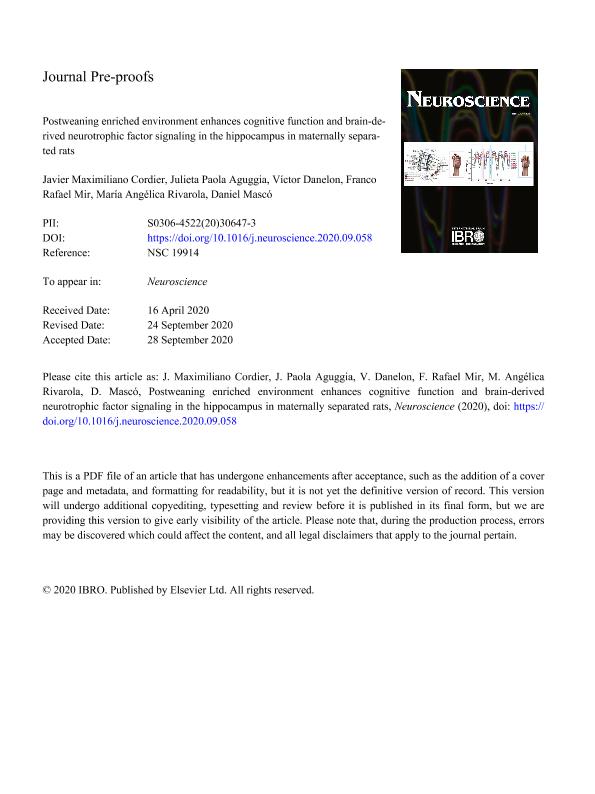Artículo
Postweaning Enriched Environment Enhances Cognitive Function and Brain-Derived Neurotrophic Factor Signaling in the Hippocampus in Maternally Separated Rats
Cordier, Javier Maximiliano ; Aguggia, Julieta Paola
; Aguggia, Julieta Paola ; Danelon, Víctor
; Danelon, Víctor ; Mir, Franco Rafael
; Mir, Franco Rafael ; Rivarola, María Angélica
; Rivarola, María Angélica ; Masco, Daniel Hugo
; Masco, Daniel Hugo
 ; Aguggia, Julieta Paola
; Aguggia, Julieta Paola ; Danelon, Víctor
; Danelon, Víctor ; Mir, Franco Rafael
; Mir, Franco Rafael ; Rivarola, María Angélica
; Rivarola, María Angélica ; Masco, Daniel Hugo
; Masco, Daniel Hugo
Fecha de publicación:
15/01/2021
Editorial:
Pergamon-Elsevier Science Ltd
Revista:
Neuroscience
ISSN:
0306-4522
Idioma:
Inglés
Tipo de recurso:
Artículo publicado
Clasificación temática:
Resumen
Adverse environments during early life may lead to different neurophysiological and behavioral consequences, including depression and learning and memory deficits that persist into adulthood. Previously, we demonstrated that exposure to an enriched environment during adolescence mitigates the cognitive impairment observed after maternal separation in a task-specific manner. However, underlying neural mechanisms are still not fully understood. The current study examines the effects of neonatal maternal separation (MS) and postweaning environmental enrichment (EE) on spatial learning and memory performance in a short version of the Barnes Maze, active and passive behaviors in the forced swim test, and on TrkB/BDNF receptor expression in the hippocampus. Our results revealed that MS impaired acquisition learning and that enriched rats performed better than non-enriched rats in acquisition trials, regardless of early conditions. During the probe, enriched-housed rats demonstrated better performance than those reared in standard conditions. No significant differences between groups were found in the forced swim test. Both MS and EE increase full-length TrkB expression, and the combination of MS and EE treatment caused the highest levels of this protein expression. Similarly, truncated TrkB expression was higher in the MS/EE group. Animal facility rearing (AFR) non-enriched groups present the lowest activation of phosphorylated Erk, a canonical downstream kinase of TrkB signaling. Taken together, our results demonstrate the importance of enriched environment as an intervention to ameliorate the effects of maternal separation on spatial learning and memory. TrkB/BDNF signaling could mediate neuroplastic changes related to learning and memory during exposure to enriched environment.
Archivos asociados
Licencia
Identificadores
Colecciones
Articulos(IDEA)
Articulos de INSTITUTO DE DIVERSIDAD Y ECOLOGIA ANIMAL
Articulos de INSTITUTO DE DIVERSIDAD Y ECOLOGIA ANIMAL
Articulos(IIBYT)
Articulos de INSTITUTO DE INVESTIGACIONES BIOLOGICAS Y TECNOLOGICAS
Articulos de INSTITUTO DE INVESTIGACIONES BIOLOGICAS Y TECNOLOGICAS
Articulos(INICSA)
Articulos de INSTITUTO DE INVESTIGACIONES EN CIENCIAS DE LA SALUD
Articulos de INSTITUTO DE INVESTIGACIONES EN CIENCIAS DE LA SALUD
Citación
Cordier, Javier Maximiliano; Aguggia, Julieta Paola; Danelon, Víctor; Mir, Franco Rafael; Rivarola, María Angélica; et al.; Postweaning Enriched Environment Enhances Cognitive Function and Brain-Derived Neurotrophic Factor Signaling in the Hippocampus in Maternally Separated Rats; Pergamon-Elsevier Science Ltd; Neuroscience; 453; 15-1-2021; 138-147
Compartir
Altmétricas



